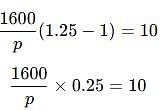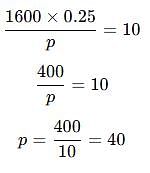Quant Exam > Quant Questions > A reduction of 20% in the price of rice enabl...
Start Learning for Free
A reduction of 20% in the price of rice enables a man to buy 10 kg more rice for Rs. 1600. Find the reduced price of rice per kg.
- a)Rs. 25
- b)Rs. 12
- c)Rs. 32
- d)None
- e)All of the above
Correct answer is option 'C'. Can you explain this answer?
Verified Answer
A reduction of 20% in the price of rice enables a man to buy 10 kg mor...
Given:
- A reduction of 20% in the price of rice enables a man to buy 10 kg more rice for Rs. 1600.
- We need to find the reduced price of rice per kg.
Step 1: Let the original price of rice per kg be p Rs.
After a reduction of 20%, the new price per kg of rice becomes:

After a reduction of 20%, the new price per kg of rice becomes:

Step 2: Set up the equation.
- The man spends Rs. 1600 to buy rice, and the reduction in price enables him to buy 10 kg more rice.
- At the original price p, the quantity of rice he could buy with Rs. 1600 is:
1600/p - At the reduced price 0.8p, the quantity of rice he can buy with Rs. 1600 is:

- According to the problem, the difference in the quantity of rice purchased is 10 kg:

Step 3: Solve the equation.
- Factor out 1600/p:

- Simplify 1/0.8:

Now the equation becomes:

- Solve for p:

Step 4: Find the reduced price.
- The original price of rice per kg is Rs. 40.
- The reduced price per kg is:
0.8 × 40 = 32 Rs.
The reduced price of rice per kg is Rs. 32.
Most Upvoted Answer
A reduction of 20% in the price of rice enables a man to buy 10 kg mor...
Let the original price of rice = Rs. x/kg
New price = Rs 4x/5 kg
According to question,
[1600/(4x/5)] - (1600/x) = 10
=>(8000/4x) - (1600/x) = 10
=>40x = 1600 {By solving above equation}
=>x = 40
Hence the original price of rice is 40 rupees per kg.
for the reduced price equal to=(4/5)×40
=32
therefore the new price of rice is 32 rupees per kg
HENCE OPTION C IS THE ANSWER
New price = Rs 4x/5 kg
According to question,
[1600/(4x/5)] - (1600/x) = 10
=>(8000/4x) - (1600/x) = 10
=>40x = 1600 {By solving above equation}
=>x = 40
Hence the original price of rice is 40 rupees per kg.
for the reduced price equal to=(4/5)×40
=32
therefore the new price of rice is 32 rupees per kg
HENCE OPTION C IS THE ANSWER
Free Test
FREE
| Start Free Test |
Community Answer
A reduction of 20% in the price of rice enables a man to buy 10 kg mor...
Given, a reduction of 20% in the price of rice enables a man to buy 10 kg more rice for Rs. 1600.
Let the original price of rice be Rs. x per kg.
According to the question, with a 20% reduction in price, the new price of rice will be (100-20)% = 80% of the original price = 0.8x per kg.
Let the man's initial purchase be y kg.
Then, with the reduction in price, he can buy (y+10) kg at the new price.
According to the question, the total cost of the initial purchase was Rs. 1600.
So, we have xy = 1600.
Also, the cost of the new purchase is (y+10)(0.8x) = 0.8xy + 8x.
But, we know that the total cost of both purchases is Rs. 1600 + Rs. 1600 = Rs. 3200.
Therefore, xy + 0.8xy + 8x = 3200.
Simplifying, we get 1.8xy + 8x = 3200.
Substituting xy = 1600, we get 1.8(1600) + 8x = 3200.
Solving for x, we get x = Rs. 32 per kg.
Therefore, the reduced price of rice per kg is 0.8x = 0.8(32) = Rs. 25.60 per kg, which is closest to option C, Rs. 32 per kg.
Let the original price of rice be Rs. x per kg.
According to the question, with a 20% reduction in price, the new price of rice will be (100-20)% = 80% of the original price = 0.8x per kg.
Let the man's initial purchase be y kg.
Then, with the reduction in price, he can buy (y+10) kg at the new price.
According to the question, the total cost of the initial purchase was Rs. 1600.
So, we have xy = 1600.
Also, the cost of the new purchase is (y+10)(0.8x) = 0.8xy + 8x.
But, we know that the total cost of both purchases is Rs. 1600 + Rs. 1600 = Rs. 3200.
Therefore, xy + 0.8xy + 8x = 3200.
Simplifying, we get 1.8xy + 8x = 3200.
Substituting xy = 1600, we get 1.8(1600) + 8x = 3200.
Solving for x, we get x = Rs. 32 per kg.
Therefore, the reduced price of rice per kg is 0.8x = 0.8(32) = Rs. 25.60 per kg, which is closest to option C, Rs. 32 per kg.

|
Explore Courses for Quant exam
|

|
Similar Quant Doubts
A reduction of 20% in the price of rice enables a man to buy 10 kg more rice for Rs. 1600. Find the reduced price of rice per kg.a)Rs. 25b)Rs. 12c)Rs. 32d)Nonee)All of the aboveCorrect answer is option 'C'. Can you explain this answer?
Question Description
A reduction of 20% in the price of rice enables a man to buy 10 kg more rice for Rs. 1600. Find the reduced price of rice per kg.a)Rs. 25b)Rs. 12c)Rs. 32d)Nonee)All of the aboveCorrect answer is option 'C'. Can you explain this answer? for Quant 2025 is part of Quant preparation. The Question and answers have been prepared according to the Quant exam syllabus. Information about A reduction of 20% in the price of rice enables a man to buy 10 kg more rice for Rs. 1600. Find the reduced price of rice per kg.a)Rs. 25b)Rs. 12c)Rs. 32d)Nonee)All of the aboveCorrect answer is option 'C'. Can you explain this answer? covers all topics & solutions for Quant 2025 Exam. Find important definitions, questions, meanings, examples, exercises and tests below for A reduction of 20% in the price of rice enables a man to buy 10 kg more rice for Rs. 1600. Find the reduced price of rice per kg.a)Rs. 25b)Rs. 12c)Rs. 32d)Nonee)All of the aboveCorrect answer is option 'C'. Can you explain this answer?.
A reduction of 20% in the price of rice enables a man to buy 10 kg more rice for Rs. 1600. Find the reduced price of rice per kg.a)Rs. 25b)Rs. 12c)Rs. 32d)Nonee)All of the aboveCorrect answer is option 'C'. Can you explain this answer? for Quant 2025 is part of Quant preparation. The Question and answers have been prepared according to the Quant exam syllabus. Information about A reduction of 20% in the price of rice enables a man to buy 10 kg more rice for Rs. 1600. Find the reduced price of rice per kg.a)Rs. 25b)Rs. 12c)Rs. 32d)Nonee)All of the aboveCorrect answer is option 'C'. Can you explain this answer? covers all topics & solutions for Quant 2025 Exam. Find important definitions, questions, meanings, examples, exercises and tests below for A reduction of 20% in the price of rice enables a man to buy 10 kg more rice for Rs. 1600. Find the reduced price of rice per kg.a)Rs. 25b)Rs. 12c)Rs. 32d)Nonee)All of the aboveCorrect answer is option 'C'. Can you explain this answer?.
Solutions for A reduction of 20% in the price of rice enables a man to buy 10 kg more rice for Rs. 1600. Find the reduced price of rice per kg.a)Rs. 25b)Rs. 12c)Rs. 32d)Nonee)All of the aboveCorrect answer is option 'C'. Can you explain this answer? in English & in Hindi are available as part of our courses for Quant.
Download more important topics, notes, lectures and mock test series for Quant Exam by signing up for free.
Here you can find the meaning of A reduction of 20% in the price of rice enables a man to buy 10 kg more rice for Rs. 1600. Find the reduced price of rice per kg.a)Rs. 25b)Rs. 12c)Rs. 32d)Nonee)All of the aboveCorrect answer is option 'C'. Can you explain this answer? defined & explained in the simplest way possible. Besides giving the explanation of
A reduction of 20% in the price of rice enables a man to buy 10 kg more rice for Rs. 1600. Find the reduced price of rice per kg.a)Rs. 25b)Rs. 12c)Rs. 32d)Nonee)All of the aboveCorrect answer is option 'C'. Can you explain this answer?, a detailed solution for A reduction of 20% in the price of rice enables a man to buy 10 kg more rice for Rs. 1600. Find the reduced price of rice per kg.a)Rs. 25b)Rs. 12c)Rs. 32d)Nonee)All of the aboveCorrect answer is option 'C'. Can you explain this answer? has been provided alongside types of A reduction of 20% in the price of rice enables a man to buy 10 kg more rice for Rs. 1600. Find the reduced price of rice per kg.a)Rs. 25b)Rs. 12c)Rs. 32d)Nonee)All of the aboveCorrect answer is option 'C'. Can you explain this answer? theory, EduRev gives you an
ample number of questions to practice A reduction of 20% in the price of rice enables a man to buy 10 kg more rice for Rs. 1600. Find the reduced price of rice per kg.a)Rs. 25b)Rs. 12c)Rs. 32d)Nonee)All of the aboveCorrect answer is option 'C'. Can you explain this answer? tests, examples and also practice Quant tests.

|
Explore Courses for Quant exam
|

|
Signup for Free!
Signup to see your scores go up within 7 days! Learn & Practice with 1000+ FREE Notes, Videos & Tests.





















